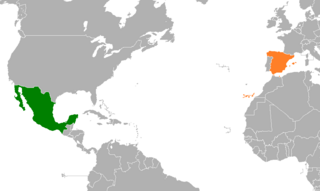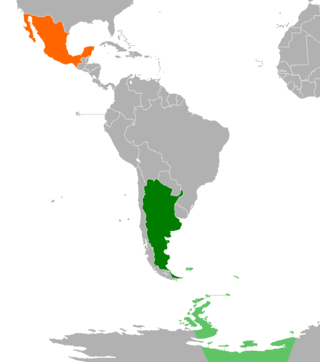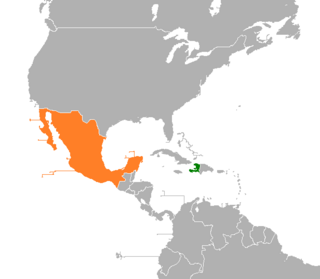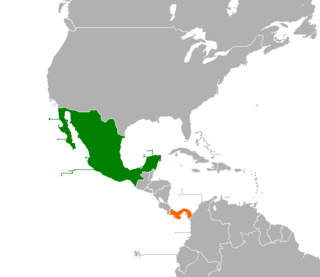
The nations of Chile and Mexico established diplomatic relations in 1831, however, relations were severed in 1974 in the aftermath of the 1973 Chilean coup d'état. Diplomatic relations were re-established in 1990 and have continued unabated since.

Ties between Mexico and Spain date back to the Spanish conquest of Mexico in 1519 and subsequent Spanish colonialism in the country which lasted until the end of the Mexican War of Independence in 1821. Formal diplomatic relations between both nations commenced in 1836 and were severed with the aftermath of the Spanish Civil War in 1939. Diplomatic relations were re-established in 1977 and have continued unabated since.

The nations of Argentina and Mexico established diplomatic relations in 1888. Both nations are members of the Community of Latin American and Caribbean States, G-20 major economies, Latin American Integration Association, Organization of American States, Organization of Ibero-American States and the United Nations.

The nations of Italy and Mexico first established formal diplomatic relations in 1874, following the unification of Italy. The two nations were twice on the opposite sides of 20th century conflicts: first in the Spanish Civil War from 1936 to 1939, and later during World War II from 1942 to 1945. Mexico re-established diplomatic relations with Italy in 1946 and relations have continued unabated since.

The nations of Mexico and Uruguay established diplomatic relations in 1831. Both nations are members of the Community of Latin American and Caribbean States, Latin American Integration Association, Organization of American States, Organization of Ibero-American States and the United Nations.

The nations of Mexico and Paraguay established diplomatic relations in 1831. Both countries are full members of the Community of Latin American and Caribbean States, Latin American Integration Association, Organization of American States, Organization of Ibero-American States and the United Nations.

Diplomatic relations between the Argentine Republic and the Republic of El Salvador have existed for over a century. Both nations are members of the Community of Latin American and Caribbean States, Group of 77, Organization of American States, Organization of Ibero-American States and the United Nations.

The nations of Mexico and Venezuela established diplomatic relations in 1831, however, diplomatic relations between both nations have been historically unstable on several occasions. During the Venezuelan presidential crisis, Mexico took a neutral position and has continued to maintain diplomatic relations with the government of President Nicolás Maduro.

Guatemala and Mexico are neighboring nations who established diplomatic relations in 1848. In January 1959 both nations broke diplomatic relations as a result of the Mexico–Guatemala conflict, however, diplomatic relations were re-established 8 months later in September of that same year. Since then diplomatic relations have continued unabated since. Diplomatic relations between both nations are based on close proximity, trade, cultural similarities and a shared history.

The nations of Mexico and Peru established diplomatic relations in 1823. Diplomatic relations were briefly cut in 1932 and reinstated again in 1933. Both nations are members of the Asia-Pacific Economic Cooperation, Community of Latin American and Caribbean States, Lima Group, Organization of Ibero-American States, Organization of American States, Pacific Alliance and the United Nations.

The nations of Mexico and Sweden established diplomatic relations in 1885. Both members of the Organisation for Economic Co-operation and Development and the United Nations.

El Salvador–Uruguay relations refers to the diplomatic relations between the Republic of El Salvador and the Oriental Republic of Uruguay. Both nations are members of the Community of Latin American and Caribbean States, Group of 77, Organization of American States, Organization of Ibero-American States and the United Nations.

The nations of Ecuador and Mexico first established diplomatic relations in 1830. In April 2024, Mexico severed diplomatic relations due to a police raid on the Mexican Embassy in Quito.

The nations of Haiti and Mexico established consular relations in 1882 and formal diplomatic relations were established in 1929. Both nations are members of Association of Caribbean States, Community of Latin American and Caribbean States, Organization of American States and the United Nations.

The nations of Honduras and Mexico established diplomatic relations in 1879. Both nations are members of the Association of Caribbean States, Community of Latin American and Caribbean States, Organization of American States, Organization of Ibero-American States and the United Nations.

The nations of Mexico and Nicaragua established diplomatic relations in 1839, however, relations were briefly severed in May 1979 and restored a few months later in July 1979 with the ousting of Nicaraguan President Anastasio Somoza Debayle. Diplomatic relations between both nations have continued unabated since.

The nations of Costa Rica and Mexico established diplomatic relations 1838. Both nations are members of the Association of Caribbean States, Community of Latin American and Caribbean States, Organization of American States, Organization of Ibero-American States and the United Nations.

The nations of Mexico and Panama established diplomatic relations in 1904. Both nations are mutual members of the Association of Caribbean States, Community of Latin American and Caribbean States, Latin American Integration Association, Organization of Ibero-American States and the Organization of American States.

The nations of Guyana and Mexico established diplomatic relations in 1973. Both nations are members of the Association of Caribbean States, Caribbean Community, Community of Latin American and Caribbean States, Organization of American States and the United Nations.

France–Peru relations are the diplomatic relations between the French Republic and the Republic of Peru. Both nations are members of the United Nations and the World Trade Organization.


























